Plot summary
Lofting is an alcoholic doctor stationed at the Terran Embassy on the planet Ahlia, noted for his benevolence to the reptilian alien natives. When he learns his old Ahlian friend Uzhegh has died he goes on a massive bender. Two friends at the embassy ply him with drink to find out why, and he reveals the story.
The events occur years before, at the time of the First Interplanetary Conference on Terra that set up the Confederated Planets. It is touch-and-go whether Ahlia will join, but vital to the agreement's success. Near the conference site, in the American suburb of Far Hills, five delinquent youths, Meehan, Fisher, Carmichael, Snow and Kraus, hang around looking for trouble, or as they view it, "fun." They spot Norman Riegel, an assistant professor of astromagnetics, out walking with the Ahlian delegate, Uzhegh of Kich. The delinquents haze the two until Uzhegh scares them off by baring his teeth and flicking his tongue. Asking Riegel why he suffered their taunts, the Ahlian learns that in Terra's overly-permissive legal environment teens can get away with practically anything, while those who try to rein them in risk prosecution. The two proceed on to the Scarron estate, where Norman and his wife Alice run a care center for offspring of the interstellar delegates. Doctor Lofting, at the time a local general practitioner, assists them by keeping their charges in good health. With the constitution ready to be signed and the young soon to be returned to their parents, a going-away party is being held.
Meanwhile, the five toughs plot vengeance for their humiliation. A brief encounter with Dr. Lofting cements their determination. They gather in disguise near the estate that evening, spying on the partying extraterrestrials until a storm breaks and they start going inside. One, the giddy, otter-like Gordonian Kranakiloa, dashes back out towards the empty swimming pool. Uzhegh's son, the responsible Tsitsav, follows to bring him back. At this point the delinquents make their move, rushing towards Kranakiloa with baseball bats; Tsitsav comes between them and takes the attack instead. They bash his skull in, though Meehan also suffers injuries. At this point Riegel and Lofting come to the rescue, and the youths flee, scattering. But Tsitsav is dead. Riegel and Lofting realize this will break up the conference, as there will be no justice for the murdered Ahlian; even if they could positively identify the culprits, as juveniles the law won't hold them responsible. They decide to report the death as an accident, a result of Tsitsav falling into the pool while trying to retrieve Kranakiloa. As the Gordonian has been frightened into hysteria by the storm and never saw the delinquents, they aren't contradicted.
Concluding his tale, Lofting tells his friends the lie stood, and as a result "there was a lot of grief and sympathy but no hostility," the conference was a success, and the agreement was signed, with Ahlia included. The Riegels, disgusted with Far Hills, moved away, and ultimately Lofting did as well. Wracked by guilt for having concealed the crime, he took to drink and got himself posted to Ahlia, where he has tried to "make it up to them" through good works. As for the delinquents, he notes that Meehan was eventually killed in a knife fight over a girl, Carmichael was jailed for burglary, Fisher died trying to fly his family's plane under a bridge, and the remaining two "grew up to be more or less normal adults." Some years later the Terran fad for permissive child-rearing gave way to a stricter disciplinary regime, "but from my point of view, the harm had been done."
"Perpetual Motion" is a science fiction short story by American writer L. Sprague de Camp, part of his Viagens Interplanetarias series. It was first published under the title "Wide-Open Planet" in the magazine Future Combined with Science Fiction Stories in the issue for September–October, 1950. It first appeared in book form under the present title in the collection The Continent Makers and Other Tales of the Viagens, published in hardcover by Twayne Publishers in 1953, and in paperback by Signet Books in 1971. It was also included in the paperback edition of The Queen of Zamba published by Dale Books in 1977. This edition was reprinted by Ace Books in 1982 as part of the standard edition of the Krishna novels. A trade paperback edition in which the story was paired with Richard Wilson's "And Then The Town Took Off" was issued by Armchair Fiction in May, 2013 as Wide-Open Planet & And Then The Town Took Off. The story has been translated into Portuguese, Dutch, and Italian.
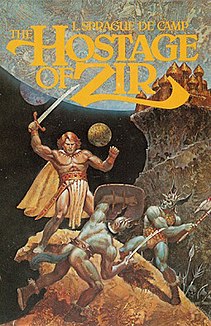
The Hostage of Zir is a science fiction novel by American writer L. Sprague de Camp, the seventh book of his Viagens Interplanetarias series and the fifth of its subseries of stories set on the fictional planet Krishna. Chronologically it is the third Krishna novel. It was first published in hardcover by Berkley/Putnam in 1977, and in paperback by Berkley Books in 1978. A new paperback edition was published by Ace Books in 1982 as part of the standard edition of the Krishna novels. An e-book edition was published by Gollancz's SF Gateway imprint on September 29, 2011 as part of a general release of de Camp's works in electronic form. The novel has also been translated into German and Czech.

A Gun for Dinosaur and Other Imaginative Tales is a short story collection by science fiction and fantasy author L. Sprague de Camp, first published in hardback by Doubleday in 1963, and in paperback by Curtis Books in 1969. The first British edition was issued by Remploy in 1974. It has also been translated into German.

Tales from Gavagan's Bar is a collection of fantasy short stories by American writers L. Sprague de Camp and Fletcher Pratt, illustrated by the latter's wife Inga Pratt. It was first published in hardcover by Twayne Publishers in 1953; an expanded edition rearranging the contents and adding pieces not in the first was published in hardcover by Owlswick Press in June 1978. The original illustrations were retained in this edition. It was subsequently issued in paperback by Bantam Books in January 1980. An e-book edition was published by Gollancz's SF Gateway imprint on September 29, 2011 as part of a general release of de Camp's works in electronic form. The collection has also been published in German.

The Tritonian Ring and Other Pusadian Tales is a 1953 collection of stories by American science fiction and fantasy author L. Sprague de Camp, first published in hardcover by Twayne Publishers. An E-book edition was published as The Tritonian Ring and Other Pasudian [sic] Tales by Gollancz's SF Gateway imprint on September 29, 2011 as part of a general release of de Camp's works in electronic form. The pieces were originally published between 1951 and 1953 in the magazines and anthologies Two Complete Science Adventure Books, Fantasy Fiction, Imagination Stories of Science and Fantasy, and Fantastic Adventures. The title story, the novel The Tritonian Ring has also been published separately.

The Continent Makers and Other Tales of the Viagens is a 1953 collection of science fiction stories by American writer L. Sprague de Camp, the fifth book in his Viagens Interplanetarias series. It was first published in hardcover by Twayne Publishers, and in paperback by Signet Books in 1971 with a cover by illustrator Bob Pepper. An E-book edition was published by Gollancz's SF Gateway imprint on September 29, 2011 as part of a general release of de Camp's works in electronic form. It has also been translated into Portuguese, Dutch, and Italian. The pieces were originally published between 1949 and 1951 in the magazines Astounding Science-Fiction, Startling Stories, Future Combined with Science Fiction, and Thrilling Wonder Stories.

Tales of Conan is a 1955 collection of four fantasy short stories by American writers Robert E. Howard and L. Sprague de Camp, featuring Howard's sword and sorcery hero Conan the Barbarian. The tales as originally written by Howard were adventure yarns mostly set in the Middle Ages; they were rewritten as Conan stories by de Camp, who also added the fantastic element. Three of the stories also appeared in the fantasy magazine Fantastic Universe, two of them before publication of the collection and the other one after. The book has also been translated into Japanese. The collection never saw publication in paperback; instead, its component stories were split up and distributed among other "Conan" collections. "The Flame Knife" was later also published as an independent paperback.
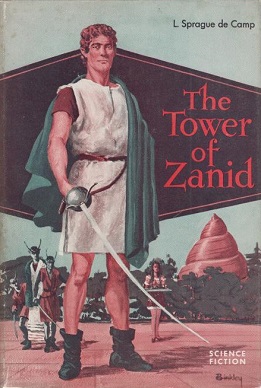
The Tower of Zanid is a science fiction novel by American writer L. Sprague de Camp, the sixth book of his Viagens Interplanetarias series and the fourth of its subseries of stories set on the fictional planet Krishna. Chronologically it is the seventh Krishna novel. It was first published in the magazine Science Fiction Stories for May 1958. It was first published in book form in hardcover by Avalon Books, also in 1958, and in paperback by Airmont Books in 1963. It has been reissued a number of times since by various publishers. For the later standard edition of Krishna novels it was published together with The Virgin of Zesh in the paperback collection The Virgin of Zesh & The Tower of Zanid by Ace Books in 1983. An E-book edition was published by Gollancz's SF Gateway imprint on September 29, 2011 as part of a general release of de Camp's works in electronic form. The novel has also been translated into Italian and German.

The Continent Makers is a science fiction novella by American writers L. Sprague de Camp, part of his Viagens Interplanetarias series. It was first published in the magazine Thrilling Wonder Stories in the issue for April, 1951. It first appeared in book form in the collection The Continent Makers and Other Tales of the Viagens, published in hardcover by Twayne Publishers in 1953, and in paperback by Signet Books in 1971. It has also been translated into Portuguese, Dutch, and Italian.

The Viagens Interplanetarias series is a sequence of science fiction stories by L. Sprague de Camp, begun in the late 1940s and written under the influence of contemporary space opera and sword and planet stories, particularly Edgar Rice Burroughs's Martian novels. Set in the future in the 21st and 22nd centuries, the series is named for the quasi-public Terran agency portrayed as monopolizing interstellar travel, the Brazilian-dominated Viagens Interplanetarias. It is also known as the Krishna series, as the majority of the stories belong to a sequence set on a fictional planet of that name. While de Camp started out as a science fiction writer and his early reputation was based on his short stories in the genre, the Viagens tales represent his only extended science fiction series.
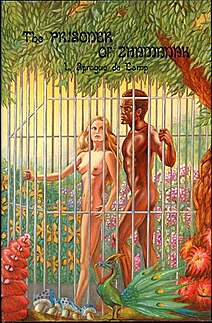
The Prisoner of Zhamanak is a science fiction novel by American writer L. Sprague de Camp, the eighth book of his Viagens Interplanetarias series and the sixth of its subseries of stories set on the fictional planet Krishna. Chronologically it is the fourth Krishna novel. It was first published in hardcover by Phantasia Press in 1982, and in paperback by Ace Books in April 1983 as part of the standard edition of the Krishna novels. An E-book edition was published by Gollancz's SF Gateway imprint on September 29, 2011 as part of a general release of de Camp's works in electronic form. The novel has also been translated into German.
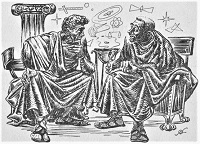
"Aristotle and the Gun" is a time travel and alternate history science fiction story by American writer L. Sprague de Camp.

"The Inspector's Teeth" is a science fiction short story by American writer L. Sprague de Camp, part of his Viagens Interplanetarias series. It is the first (chronologically) set on Earth, and a linchpin tale in the sequence, showing how the interstellar political system forming the background of the rest of the series was established. It was first published in the magazine Astounding in the issue for April, 1950. It first appeared in book form in the collection The Continent Makers and Other Tales of the Viagens, published in hardcover by Twayne Publishers in 1953, and in paperback by Signet Books in 1971. It also appeared in The Best of L. Sprague de Camp, and Anthropomorphic Aliens: An Interstellar Anthology. The story has been translated into Portuguese, Dutch, Italian and German.

"The Colorful Character" is a science fiction short story by American writer L. Sprague de Camp, part of his Viagens Interplanetarias series. It was first published in the magazine Thrilling Wonder Stories in the issue for December, 1949. It first appeared in book form in the collection Sprague de Camp's New Anthology of Science Fiction, published simultaneously in hardcover by Hamilton and in paperback by Panther Books in 1953.

"Judgment Day" is an apocalyptic science fiction story by American writer L. Sprague de Camp. It was first published in the magazine Astounding Science Fiction for August, 1955, and first appeared in book form in the anthology The Best Science Fiction Stories and Novels: 1956. It later appeared in the de Camp collections A Gun for Dinosaur and Other Imaginative Tales, and The Best of L. Sprague de Camp, as well as the anthologies Great Science-Fiction, A Science Fiction Argosy, and Masters of Darkness III. The story has also been translated into German.

"The Gnarly Man" is a science fiction story by American writer L. Sprague de Camp, about an apparently immortal Neanderthal Man surviving into the present day.
"The Egg" is a science fiction short story by L. Sprague de Camp. It was first published in the magazine Satellite Science Fiction for October, 1956. It first appeared in book form in the collection A Gun for Dinosaur and Other Imaginative Tales. The story has been translated into German.

"In-Group" is a science fiction short story by L. Sprague de Camp. It was first published in the magazine Marvel Science Fiction for May, 1952. and later reprinted in the magazine Skyworlds for February 1978. It first appeared in book form in the collection A Gun for Dinosaur and Other Imaginative Tales. The story has been translated into Italian and German.
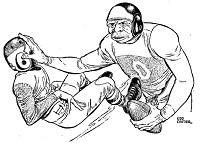
"Throwback" is a classic science fiction short story featuring atavism by L. Sprague de Camp. It was first published in the magazine Astounding Science Fiction for March, 1949. It first appeared in book form in the collection A Gun for Dinosaur and Other Imaginative Tales ; it later appeared in the anthology Apeman, Spaceman. The story has been translated into Italian and German.
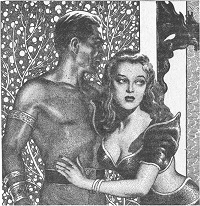
"Cornzan the Mighty" is a classic science fiction story by L. Sprague de Camp. It was first published under the variant title "Cornzan, the Mighty" in the magazine Future Science Fiction for December, 1955. All later appearances omit the comma. It first appeared in book form in the collection A Gun for Dinosaur and Other Imaginative Tales. The story has been translated into German.

















